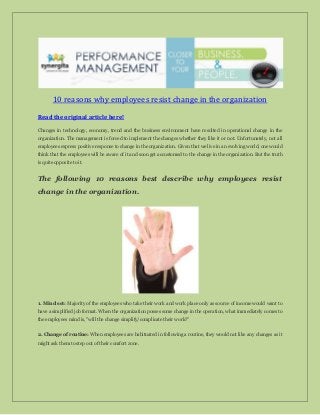10 reasons why employees resist change in the organization
•
3 recomendaciones•12,885 vistas
Changes in technology, economy, trend and the business environment have resulted in operational change in the organization. The management is forced to implement the changes whether they like it or not. Unfortunately, not all employees express positive response to change in the organization. Given that we live in an evolving world, one would think that the employees will be aware of it and soon get accustomed to the change in the organization. But the truth is quite opposite to it.
Denunciar
Compartir
Denunciar
Compartir
Descargar para leer sin conexión

Recomendados
Recomendados
Más contenido relacionado
Destacado
Destacado (11)
Professionelles Veränderungsmanagement für Führungskräfte

Professionelles Veränderungsmanagement für Führungskräfte
Erfolgsfaktor Mitarbeiteraktzeptanz - Mit Change Management zum Erfolg

Erfolgsfaktor Mitarbeiteraktzeptanz - Mit Change Management zum Erfolg
Change Management Einblicke - Blue Change Solutions

Change Management Einblicke - Blue Change Solutions
Understanding, Initiating and Managing Change by Catherine Adenle

Understanding, Initiating and Managing Change by Catherine Adenle
21 Critical Questions to Ask before Change Management

21 Critical Questions to Ask before Change Management
10 reasons why employees resist change in the organization
- 1. 10 reasons why employees resist change in the organization Read the original article here! Changes in technology, economy, trend and the business environment have resulted in operational change in the organization. The management is forced to implement the changes whether they like it or not. Unfortunately, not all employees express positive response to change in the organization. Given that we live in an evolving world, one would think that the employees will be aware of it and soon get accustomed to the change in the organization. But the truth is quite opposite to it. The following 10 reasons best describe why employees resist change in the organization. 1. Mind set: Majority of the employees who take their work and work place only as source of income would want to have a simplified job format. When the organization posses some change in the operation, what immediately comes to the employees mind is, "will the change simplify/complicate their work?" 2. Change of routine: When employees are habituated in following a routine, they would not like any changes as it might ask them to step out of their comfort zone.
- 2. 3. Lack of knowledge/expertise: Employees may resist change simply because they lack sufficient knowledge about the change taking place in the organization or lack of expertise. Not knowing much about the specifics of the change, they imagine it to be difficult to deal with and therefore, they resist giving the change a chance. 4. Workload: Change in organization would initially be hard for employees as it would take time for them to understand. Consequently, the processing of the change makes them feel loaded with work which is why they resist change. 5. Unwilling to learn: Some employees feel that their work does not need any advancement and therefore are unwilling to learn something new and are hesitant to change. 6. No change in compensation: Compensation is one of the main factors that make employees perform better. If they feel that the change in operations would not make any good difference on their pay-slip, then they abide the change in organization. 7. Fear: Fear could be of not knowing much about the imposed change, losing their position and if the change will bring improvement or not. At the hand of fear, they fail to realize that the change is needed for the organization to stay competitive. Thus, they resist change as they are satisfied with the present workflow. 8. Peer Pressure: Some employees blindly follow their colleagues/team mates without even knowing if the change would affect them or not. 9. Loss of freedom: Employees grooved to certain level of personal freedom at workplace would not want to let go of that. 10. Past experience: Few bad experiences from their ex organization would spring into action when there is a change in the organization and apparently they resist it. Follow us on Facebook!
